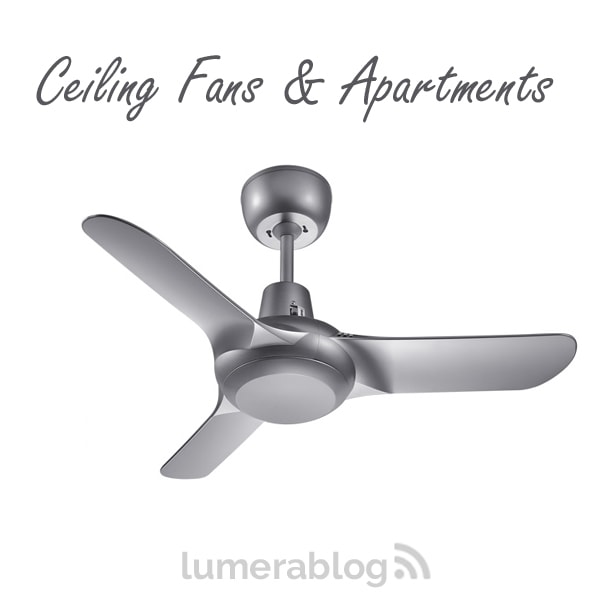What to consider when Looking to Install a Ceiling Fan in Your Apartment

Live in an apartment and want a ceiling fan ? Well most likely you can, there may be some more restrictions than in your average home, but we have a whole lot of tips and options to potentially make it work!
For rooms with limited space we have a great range of small ceiling fans or for apartments with a lower than average ceiling height we have several low-profile fans that may just be the perfect solution. The below outline of the typical obstacles will assist you in tackling these common hurdles and guide you in finding a fan that may just suit your needs.
Lower Ceiling Heights
This is one of the most common concerns that can arise when thinking about ceiling fans for apartments but is also one of the simplest to combat with fans in our range. Australian regulations state that the floor to blade measurement has to be a minimum of 2.1m, therefore the fan blades will not be able to hang past this point. The fan with the lowest drop in our range measures only 169mm from Ceiling to Blade! So, if you have a ceiling height of roughly 2.3 or higher we’ll certainly be able to help!
View our full range of Low Profile Fans
Smaller than Average Rooms
Some rooms can be smaller than standard and this may mean you’re finding it difficult to find a fan that will look proportionate to the size of the space. Look no further, we have a category complete with fans that range from a tiny 36 inches to 42 inches in a range of styles.
To make this search a little easier particularly if you need an extremely small fan the Spyda has a 36” blade span option and is also LED light adaptable! If you have a larger room as well and want an identical fan in both the small and large size look no further than the Spyda, also available with a 49 or 56” blade span. Click here to view the Spyda range.
When you can’t Install New/More Wiring
You may also find that your electrician is not able to install any extra wiring – this is a very common issue in apartments. If this is the case, the perfect option is to replace the current light/s in favour of a ceiling fan that can also act as your primary light source and that is remote controlled! This set up will usually mean that you use the existing wiring to draw the electricity to your new fan and light, and the remote control will control both the fan and the light. The old light switch on the wall will become an isolation switch to the whole unit.
In some cases, the electrician will be able to run extra wiring in the ceiling to give the fan power, but not connect it to a light switch. In that case, you can get a fan with a remote (no light) and not interfere with the current lighting set up. The electrician will still need to set up an isolation switch somewhere to comply with regulations and for safety purposes.
One question that sometimes comes up is whether the remote control that comes with the selected ceiling fan can also be wired to control the pre-existing lighting. The remote that comes with the fan has not been manufactured for this purpose and are generally fan or brand specific. Therefore, it should only be used to control the fan and the integrated light where applicable. Even if your electrician may be able to make it work, these unique wiring solutions are often short-lived and problems usually persist following this installation. When these operational issues occur both the fan and any remotes will no longer be covered by the manufacturer warranty as they are not intended to be wired in such a way.
If you wish for the fan and the rooms light source to be used with the same remote, replacing the existing lighting for a fan with a light is an option worth considering. Alternatively, select a fan that can be wall controlled and before purchasing speak to an electrician about the possibility of having it placed near the existing lighting control (if possible) to make it convenient to turn both on and off simultaneously.
Ceiling fans and Lighting
One small thing to keep in mind is that not all ceiling fans have a light option. When looking at our listings look out for those fans that are either light adaptable meaning the fan will have a light kit which can be added as an accessory or are available in a separate model with an integrated light built in.
To make it easier to browse fans that have a light option check out the following two categories.
Fans with Light
Fans with LED Light
Small Fans with Lights
In a smaller room, if the fan has a quality light this will be more than adequate. When searching for a fan that would be suitable, take a look at our Small Fans category. It has a few great options!
Perhaps a 42” blade span is a little too small for your space? In that case take a look at the options available with a 42” to 50” blade span.
Ceiling Fans and Downlight Combinations
As explained above, a great, simple option is a fan with light included. However, if you’re not sold on the idea of having your ceiling fan also be your primary lighting source (and you have confirmed with your electrician that extra wiring can be installed) then there is another popular option. Installing a smaller ceiling fan may just give you the space needed to install downlights! This can be a challenge but our blog on Ceiling Fans & Downlights outlines some key tips on how to avoid the much-dreaded strobing effect.
If unsure of which fan might be suitable for your space do not hesitate to contact us on: 03 9017 1161 or send us an email to [email protected]
We do also recommend consulting an electrician to double check that a ceiling fan can be installed in your planned location. This is just a precaution as in some apartments the electrician may feel there is no way to install it safely or there may be limited access to be able to wire it.
Follow us: Facebook
